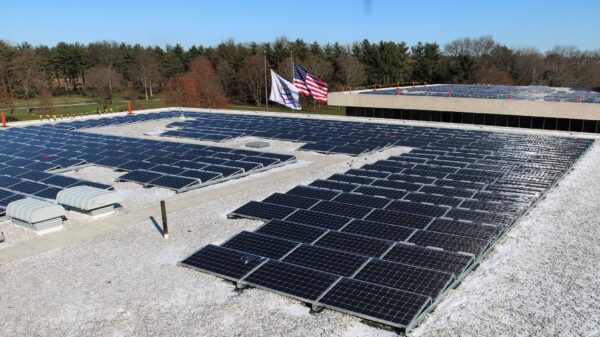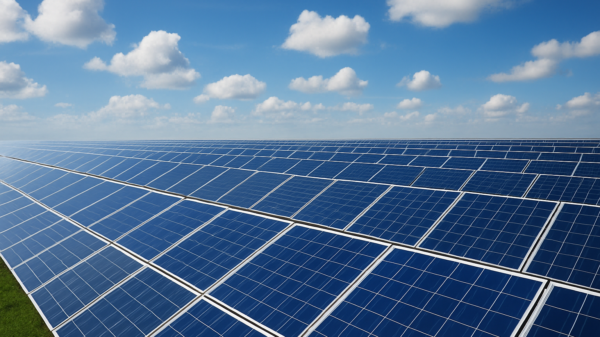Solar and other clean energy stocks have been hammered after the election of Donald Trump last week.
The fluctuations represent a significant market reaction to the political shift towards policies favouring fossil fuels over renewable energy sources.
Stock prices for companies in the solar and wind energy sectors dropped sharply following Trump’s win.
First Solar Inc (NASDAQ: FSLR) fell over 10 per cent in early trading, while other solar companies like Enphase Energy Inc (NASDAQ: ENPH) and Sunrun Inc (NASDAQ: RUN) also experienced significant declines.
This sell-off stemmed from Trump’s campaign rhetoric against renewable energy, especially his promise to terminate the Inflation Reduction Act (IRA), which he referred to as the “Socialist Green New Deal.”
ETFs like the Invesco Solar ETF (NYSEARCA: TAN) and iShares Global Clean Energy ETF (NASDAQ: ICLN) lost value, with declines of around 10 per cent and 8 per cent, respectively, as the market showed broad concern about renewable energy prospects under a Trump administration.
Two years ago, the Biden administration signed the Inflation Reduction Act (IRA), enabling hundreds of renewable energy companies to access USD$369 billion in tax breaks and subsidies for clean energy.
In the following year, the administration passed the Infrastructure Investment and Jobs Act (IIJA), authorizing USD$1.2 trillion in spending for transportation and infrastructure. The act allocated USD$43 billion in flexible spending (not including loans and tax incentives) for purposes such as battery manufacturing, retooling auto industry facilities, retraining and rehiring auto workers, and upgrading the power grid.
Additionally, more than USD$7.5 billion was dedicated to expanding EV infrastructure.
Read more: Albemarle Corporation loses $1B as supply glut pulls lithium prices down
Read more: Australian lithium company gets US government nod to develop Nevada project
Trump’s administration will hinder climate law implementation
Republican-led efforts to repeal major parts of the IRA have failed so far, but it could face serious threats under a new Trump administration. While Trump may lack the power to unilaterally roll back the climate law, he could make its implementation more difficult, said Shannon Rinehart, portfolio manager at global asset management firm, Threadneedle.
His administration could hinder the law by revising treasury department rules that have yet to be finalized, holding back some loans and grants, or tightening limits on tax credits.
“Some parts of the IRA will face more pushback from Republicans than others. We’re trying to steer clear of those parts,” said Chris Berkouwer, portfolio manager at Netherland-based global asset maangement firm, Robeco.
According to Berkouwer, investments aimed at improving grid infrastructure will likely receive bipartisan support. However, while Democrats may want the grid strengthened to accommodate the rollout of more renewables, Republicans will likely favour infrastructure that supports coal and gas power generation utilities.
Market analysts, including those at Morningstar, noted that despite the initial stock drops, structural drivers for renewable energy—such as technological advancements and state-level commitments—would likely continue to fuel growth. Many viewed this sell-off as a buying opportunity, anticipating that renewable energy companies would eventually recover and benefit from these ongoing trends.
Trump’s promise to expand oil and gas production while criticizing green technologies like wind turbines and electric vehicles created uncertainty in the market.
Yet, the complexity of U.S. energy policy and the economic benefits of clean energy in several states indicate that even if federal support decreases, private sector investments and state policies may continue to drive renewable energy forward.
Read more: Fission Uranium develops Athabasca Basin profile with four new properties
Read more: Westinghouse hits milestone for eVinci microreactor
Tesla stock improves despite Trump’s EV skepticism
Companies like Danish multinational energy company, Orsted, which Trump has publicly opposed, saw significant share price drops, with declines reaching up to 14 per cent post-election. These declines reflected concerns over potential policy changes that could halt or delay offshore wind projects.
Despite Trump’s historical skepticism towards electric vehicles, Tesla Inc (NASDAQ: TSLA) stock surged, gaining over 8 per cent in early trading sessions following the election and surpassing a USD$1 trillion market valuation for the first time in two years.
This anomaly may stem from Trump’s recent softening stance on electric cars, influenced by support from figures like Elon Musk, suggesting that not all alternative energy stocks would necessarily suffer under Trump’s policies.
Regardless, Trump is likely to face pushback from his own party if he attempts to eliminate the IRA.
In September, 18 Republicans in the House of Representatives signed a letter to Speaker Mike Johnson, urging him not to pursue “prematurely repealing energy tax credits” that support new IRA investments, most of which have gone to Republican states.
A 2022 report by Climate Central revealed that red states have actually benefited more from the IRA than blue states. The report highlighted that Iowa and Oklahoma, among the most Republican states with GOP governors and majority Republican legislatures, lead the nation in wind power production.
Meanwhile, California and Florida are the largest producers of solar power, and Texas is a leader in both solar and wind power. The report attributes the rapid growth of renewable energy generation to both state and federal incentives.
.














